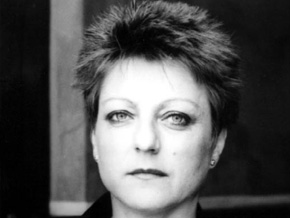Herta Müller: Nobel Prize Winner

Photo of Herta Müller courtesy of Picador
Romanian-born German novelist Herta Müller's brutal yet poetic portrayal of the oppressed life in Communist Romania earned her 2009's Nobel Prize in Literature. Although she is the 12th woman to receive the award since 1901 and five of her books have been translated into English, she remains relatively unknown outside of Europe.
Müller's work has depicted the themes of exile, persecution and censorship that she knows all too well. In 1945, her mother, along with other members of the German-speaking minority in Romania, was deported and spent five years at a work camp in the Soviet Union. Müller was born in Romania in 1953; in the '70s, she studied German and Romanian literature at the university in Timisoara where she associated with a group of writers who criticized the dictatorship of Nicolae Ceausescu and called for the freedom of speech. Later, Müller was employed as a translator at a machine factory—but she was fired when she refused to be an informant for the secret police, who then harassed her for years.
Much like her personal life, her stories have experienced a similar fate. In 1982, Müller's debut collection of short stories was censored and was criticized by Romania's national press; it was later published uncensored in Germany in 1984. Because of her criticism of Ceausescu's dictatorship in Romania, Müller was banned from publishing in her own country.
In 1987, Müller and her husband, author Richard Wagner, immigrated to Germany, where they currently live. Now an internationally-known author, her works have been translated into multiple languages.
Read an excerpt from Müller's book, The Appointment, about a young woman who is summoned by the secret police for sewing notes into men's suits bound for Italy that say "marry me."
Is there a woman writer you think everyone should read? Tell us what you love about the writer and which of her books you'd recommend. Share your thoughts below.
Müller's work has depicted the themes of exile, persecution and censorship that she knows all too well. In 1945, her mother, along with other members of the German-speaking minority in Romania, was deported and spent five years at a work camp in the Soviet Union. Müller was born in Romania in 1953; in the '70s, she studied German and Romanian literature at the university in Timisoara where she associated with a group of writers who criticized the dictatorship of Nicolae Ceausescu and called for the freedom of speech. Later, Müller was employed as a translator at a machine factory—but she was fired when she refused to be an informant for the secret police, who then harassed her for years.
Much like her personal life, her stories have experienced a similar fate. In 1982, Müller's debut collection of short stories was censored and was criticized by Romania's national press; it was later published uncensored in Germany in 1984. Because of her criticism of Ceausescu's dictatorship in Romania, Müller was banned from publishing in her own country.
In 1987, Müller and her husband, author Richard Wagner, immigrated to Germany, where they currently live. Now an internationally-known author, her works have been translated into multiple languages.
Read an excerpt from Müller's book, The Appointment, about a young woman who is summoned by the secret police for sewing notes into men's suits bound for Italy that say "marry me."
Is there a woman writer you think everyone should read? Tell us what you love about the writer and which of her books you'd recommend. Share your thoughts below.



